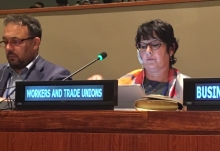Cities are for people. Let’s put people first on the urban agenda.

Workers make cities happen. Neither politicians nor business can make it without workers. Therefore, decent work for all is a precondition for urban socio-economic inclusion and local economic development. The digital revolution should be seen as a motor for redistributing working time and opportunities in our cities.
Labour and environmental clauses in public procurement as well as public contract transparency and disclosure are key to sustainable urban development. To secure the necessary public funding cities need coordinated policies to fight tax evasion, tax avoidance and corruption. Protecting public spaces and commons from privatization and gentrification have a direct and positive effect on democracy and equity.
The financialization of housing is directly opposed to the idea that housing is a human right linked to personal dignity, security and the ability to thrive in communities and it played a major part in the 2008 financial crisis. Strong public policies and governance for housing are needed to avoid this scenario again.
Public policies can produce social cohesion or turmoil. Affordable, gender-responsive and universally accessible public education, health and social services, including for migrants and refugees, are essential to create sustainable economic and social development, address growing racism and xenophobia and reduce poverty and inequality.
Only 65% of the urban population is served by municipal waste collection, and in many developing regions less than 50% of solid waste is safely disposed of. This affects the protection of public health and environment, waste management should therefore be public, transparent and involve participation of users, communities and workers to secure continuity and accountability.
Cities are for people. Let’s put people first on the urban agenda.
More information:
- Spotlight on Sustainable Development report
- PSI Spotlight on SDG11: To ensure sustainable waste services, we must value waste workers and make sure they are in decent jobs
- PSI's work on the 2030 Agenda for Sustainable Development
- PSI's work on Local and Regional/Municipal sector
- PSI''s work on Privatisation and PPPs - See the peopleoverprof.it platform
- UN HLPF website

